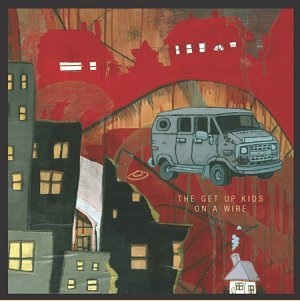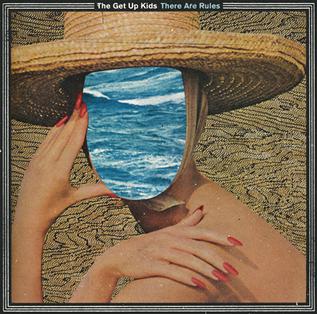
Something to Write Home About is the second studio album by American rock band the Get Up Kids, released on September 28, 1999, through Vagrant Records and the band's own label Heroes & Villains Records. Following the promotional tours for their debut album Four Minute Mile (1997), the band were in discussion with Mojo Records. During this period, James Dewees joined as the band's keyboardist. As negotiations with the label eventually stalled, they eventually went with Vagrant Records. They recorded their next album at Mad Hatter Studios in Silver Lake, Los Angeles, California, co-producing it with Chad Blinman and Alex Brahl. Described as an emo and pop-punk album, Something to Write Home About expands on the harder edge of its predecessor, with frontman Matt Pryor citing the works of the Foo Fighters, Jimmy Eat World and Wilco as influences.

The Get Up Kids are an American rock band from Kansas City. Formed in 1995, the band was a major act in the mid-1990s Midwest emo scene, otherwise known as the "second wave" of emo music. Their second album Something to Write Home About remains their most widely acclaimed album, and is considered to be one of the quintessential albums of the second-wave emo movement. They are considered forefathers of the emo genre, and have been widely credited as being an influence, both by contemporaries Saves the Day and later bands such as Fall Out Boy, Taking Back Sunday and the Wonder Years.
The New Amsterdams is an American band featuring Matthew Pryor of The Get Up Kids. In a certain sense, they represented the acoustic counter-project to The Get up Kids. In contrast to The Get Up Kids, this project features acoustic guitars, the accordion, wind instruments, strings, and mature elements of American folklore. Among the members were also numerous musicians and contributors of The Get Up Kids and other friendly bands.

Four Minute Mile is the debut studio album by American rock band the Get Up Kids.

From Here to Infirmary is the third studio album by American punk rock band Alkaline Trio. It was their first album for Vagrant and their only album with Mike Felumlee, who replaced their previous drummer, Glenn Porter. When Felumlee left the band shortly after the album's release, Atom Willard filled in on tour and appeared in the music video for "Private Eye", before Derek Grant became their new permanent drummer.

On a Wire is the third studio album by American rock band the Get Up Kids on Vagrant Records. Released three years after their breakout sophomore album Something to Write Home About, On a Wire was a massive departure from the band's established sound, eschewing the brighter pop-punk that helped define emo as a genre in favor of a darker, more adult sound inspired by 70's rock bands like Led Zeppelin.

Guilt Show is the fourth studio album by American rock band The Get Up Kids. It was released on Vagrant Records on March 2, 2004.

Anthem is the fifth studio album by American ska punk band Less Than Jake, released on May 20, 2003 on Sire Records, a Warner Bros. imprint. A year after their fourth studio album Borders & Boundaries (2000), the band had spent sometime at their practice space writing new material; by the middle of 2002, the band said their next album would be with Warner Bros. Records. Following a meeting with Rob Cavallo, he was enlisted as the producer for the album. Sessions were held at Piety Street Recording in New Orleans and Morning View Studio in Malibu, California, occurring between October and December 2002.

Matthew Pryor is an American musician who lives in Lawrence, Kansas. He is best known as a founding member and the lead vocalist of The Get Up Kids, one of the most influential acts of the second-wave emo music scene.

Forget What You Know is the third studio album by American rock band Midtown. Following the release of Living Well Is the Best Revenge (2002), MCA was merged into Geffen Records, and the band was not picked up by the latter label. The group spent time writing on their next album and following a meeting with Butch Walker, moved to Atlanta, Georgia, to start recording the new material. Walker headed the producing helm and Forget What You Know was recorded in late 2003 at Ruby Red Studios. The album is classified as an emo and pop punk release; its songs were compared with those of Division of Laura Lee, Recover and Jimmy Eat World.

Tales Told by Dead Friends is the debut EP by American rock band Mayday Parade, released on June 13, 2006. The group resulted from the merger of local acts Kid Named Chicago and Defining Moment. With their line-up solidified, the first two songs they wrote together were "When I Get Home, You're So Dead" and "Three Cheers for Five Years". Soon afterwards, they recorded an EP, Tales Told by Dead Friends, with Lee Dyess. The group followed Warped Tour and sold copies to people in line. By the end of summer, the band had sold 10,000 copies of the EP. This attracted the attention of Fearless Records, who would sign the band in late August. The group went on tour from September to November, before the EP was reissued by Fearless.

Common Existence is the fifth full-length album from rock band Thursday.

There Are Rules is the fifth studio album by American rock band The Get Up Kids, the band's first studio album release since 2004's Guilt Show. After their initial reunion, the band decided to challenge themselves to write and record an album in only two weeks without using any digital technology. Ultimately, due to conflicting schedules, they dropped the two-week deadline and recorded over several months in 2009 and 2010. Much of the album was recorded in the same sessions as their first post-reunion release, Simple Science, the song "Keith Case" being featured on both.

The Hands That Thieve is the fifth studio album by the American ska-punk band Streetlight Manifesto. It was their first studio album since 2010's 99 Songs of Revolution: Vol. 1, and their first album of original material since 2007's Somewhere in the Between. In addition to the Streetlight album, an acoustic version of the album was intended to be released by Toh Kay, but was cancelled. The album was originally set to be released in the summer of 2012, but was pushed back several times due to label problems and rewrites, to its eventual release date of April 30, 2013. The album has received generally favorable critical response.

I Am King is the second studio album by American hardcore punk band Code Orange and first to be released under this moniker after previously being referred to as "Code Orange Kids". The Kurt Ballou-produced album was released on September 2, 2014 through Deathwish Inc. To promote the album, Code Orange released music videos for the tracks "I Am King" and "Dreams in Inertia", in addition to an online stream for "My World".

I Thought the Future Would Be Cooler is the sixth studio album by American musical band Yacht. It was released on October 16, 2015 via Downtown Records. Production was handled by Jona Bechtolt, Bobby Birdman and Jacknife Lee, with Justin Meldal-Johnsen co-produced one song.

Time & Space is the second studio album and major label debut by the American punk rock band Turnstile. It was released on February 23, 2018, through Roadrunner – the band's debut on the label.

Kicker is an EP by American rock band The Get Up Kids. It was the first release from the band in seven years, and their first release on a record label other than Vagrant Records in 19 years. It was hailed as a return to form after the band's more experimental self-released reunion album There Are Rules (2011).

Sister Cities is the sixth studio album by American rock band the Wonder Years.

Hit Your Head is the debut studio album by American post-hardcore band, Drug Church. The album was released on July 23, 2013 through No Sleep Records.



















